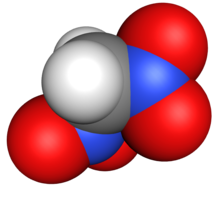Dinitromethane
 | |
 | |
| Names | |
|---|---|
| Preferred IUPAC name
Dinitromethane | |
| Identifiers | |
3D model (JSmol)
|
|
| ChemSpider | |
PubChem CID
|
|
CompTox Dashboard (EPA)
|
|
| |
| |
| Properties | |
| CH2N2O4 | |
| Molar mass | 106.037 g·mol−1 |
| Boiling point | 39 to 40 °C (102 to 104 °F; 312 to 313 K) (at 2 mmHg)[1] |
Except where otherwise noted, data are given for materials in their standard state (at 25 °C [77 °F], 100 kPa).
| |
Dinitromethane is an organic compound with the chemical formula CH2(NO2)2.[2] Purified dinitromethane is a colorless liquid with a weak pleasant odor. It is relatively stable at room temperature and can be safely stored for months at 0 °C.[1]
Synthesis
[edit]The potassium salt of dinitromethanide, KCH(NO2)2, was first prepared by Villiers in 1884 by reduction of bromodinitromethane.[3] Hydrogen fluoride and the potassium salt of dinitromethane react in diethyl ether to form dinitromethane.[1] Free dinitromethane was previously understood to be a pale, yellow oil that decomposed rapidly at ambient temperatures.[4]
Dinitromethane should not be confused with methylene dinitrate (CH2(ONO2)2), which is produced as a byproduct in the production of the explosive RDX.[5]
Safety
[edit]The transportation of dinitromethane is forbidden by the U.S. Department of Transportation.[6]
References
[edit]- ^ a b c Legin, G. Ya.; Okhlobystina, L. V.; Fainzilberg, A. A. (1965). "Preparation of pure dinitromethane and its physical properties". Russian Chemical Bulletin. 14 (12): 2190–2191. doi:10.1007/BF00846018.
- ^ Linstrom, P. J.; Mallard, W. G. (eds.). "Dinitromethane". NIST Chemistry WebBook, NIST Standard Reference Database Number 69. NIST.
- ^ Villiers, R. (1884). "Sur le bromure d'èthylène tétranitré". Bulletin de la Société Chimique de France. 41: 281.
- ^ Duden, P. (1893). "Ueber das Dinitromethan". Berichte der Deutschen Chemischen Gesellschaft. 26 (3): 3003–3011. doi:10.1002/cber.189302603135.
- ^ Luo, K.-M., Lin, S.-H., Chang, J.-G., Huang, T.-H. (2002). "Evaluations of kinetic parameters and critical runaway conditions in the reaction system of hexamine-nitric acid to produce RDX in a non-isothermal batch reactor". Journal of Loss Prevention in the Process Industries. 15 (2): 119–127. doi:10.1016/S0950-4230(01)00027-4.
{{cite journal}}: CS1 maint: multiple names: authors list (link) - ^ "DOT Hazardous Materials". Archived from the original on 2012-04-10. Retrieved 2012-03-01.
